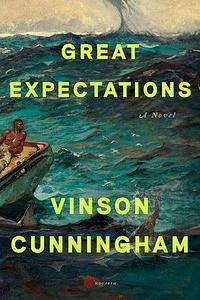Take a photo of a barcode or cover
reflective
slow-paced
hopeful
informative
reflective
medium-paced
Every page of this felt like art, every word so deliberately chosen - I had to slow down my reading to fully appreciate every sentence. I especially loved some of the commentary on religion. Just really stunning writing.
slow-paced
Plot or Character Driven:
Character
Strong character development:
No
Flaws of characters a main focus:
Yes
this book offered a really different narrative experience than i'm used to. i don't know that i've ever had a narrator so content to be a passenger in his own life. it's david's prevailing self-diagnosis that he is unmoored, unmotivated, somewhat floating through life up until — and after — his opportunity with the senator falls into his lap. david doesn't seem to stray from this feeling until the novel's final few pages, and by then, after hundreds of pages of relatively little personal growth, his closing revelations do not feel earned. i can't say i understand the choice not to name obama (or any of the other famous names to whom cunningham alludes throughout); i understand the stylistic impulse, but i'm not sure it does the novel any real service. perhaps it serves to undermine the deification of some of these figures? to emphasize the fact that many, though not all, of these people are relative nobodies to those not in the upper echelon of ultra-rich politically-adjacent so-and-sos with whom david is forced to rub elbows for a paycheck? if so, i'm left to wonder why each description is offered with a few key physical characteristics and a sly wink, knowing the audience will connect the dots. it's not lost on me that the glowing reviews of this novel i've seen are featured in the pages of the new york times and the washington post. maybe i'm just not the target audience!
the obama we know — fresh-faced, electric, inspiring a jolt of hope in a nation jaded by eight years of bush — is not present in this novel. instead, we get a "candidate" whose charisma, charm, and intrigue rarely breach the protective shield of our narrator's armor. it's a curious choice; and not one to which i'm inherently opposed! but it does leave me wondering which david is telling us this story. the older david, post-obama presidency, rose colored goggles long since discarded? the david we're seeing in real-time, somehow uniquely unaffected by perhaps one of the most exciting moments in politics this century? the david living somewhere in time in between? that question of time and place stuck with me throughout my reading experience, and i think its confusion contributed to my general disconnect from the narrator and to my inability to understand him fully.
i think cunningham explores some interesting ideas here about performance and embodiment throughout this book. if i was more personally invested in sports or religion, i think a few of these passages would have really resonated with me — i'm thinking especially about the conversation about basketball stars in the bar in new hampshire. unfortunately, these touch points just don't resonate with me; a personal issue, to be sure, but one that kept me from accessing maybe the most salient concepts this novel gives us to chew on. there is, however, a great passage towards the end of the book where david reflects on a boyhood fight between his cousins and some kids from a rival housing project to which he bore witness. it was one of the more interesting reflections on the voyeuristic nature of 21st century american politics and indictments of its key players that i've come across. shouts out to that!
the obama we know — fresh-faced, electric, inspiring a jolt of hope in a nation jaded by eight years of bush — is not present in this novel. instead, we get a "candidate" whose charisma, charm, and intrigue rarely breach the protective shield of our narrator's armor. it's a curious choice; and not one to which i'm inherently opposed! but it does leave me wondering which david is telling us this story. the older david, post-obama presidency, rose colored goggles long since discarded? the david we're seeing in real-time, somehow uniquely unaffected by perhaps one of the most exciting moments in politics this century? the david living somewhere in time in between? that question of time and place stuck with me throughout my reading experience, and i think its confusion contributed to my general disconnect from the narrator and to my inability to understand him fully.
i think cunningham explores some interesting ideas here about performance and embodiment throughout this book. if i was more personally invested in sports or religion, i think a few of these passages would have really resonated with me — i'm thinking especially about the conversation about basketball stars in the bar in new hampshire. unfortunately, these touch points just don't resonate with me; a personal issue, to be sure, but one that kept me from accessing maybe the most salient concepts this novel gives us to chew on. there is, however, a great passage towards the end of the book where david reflects on a boyhood fight between his cousins and some kids from a rival housing project to which he bore witness. it was one of the more interesting reflections on the voyeuristic nature of 21st century american politics and indictments of its key players that i've come across. shouts out to that!
This was definitely more on the literary end of my reading, which is a good thing. Sometimes I had to pause or slow-down to think about the author's meaning. I also had to look up one or two words, such as "apothatic." And, as someone who followed Obama's campaign and presidency avidly, I definitely spent a fair bit of time trying to puzzle out who was supposed to be who among the characters.
I need to sit with this book for awhile before rating it. The writing is brilliant, but it was a struggle to finish.
Great Expectations has a lot going for it. It is, for one, a fictionalized insider's view of the successful campaign of Barack Obama for the presidency of the United States, a campaign on which Cunningham worked as a staffer. Mostly, it sticks to the behind-the-scenes role of a fundraiser for the campaign, an insouciant young man who stumbles into the campaign at the behest of a friend and is surprisingly successful in this demanding role. As we know intuitively, no matter how innocent and inspirational a political campaign may be, the underbelly is a different thing altogether; I found that I was quite often put in mind of a very fancy restaurant at which I once worked briefly, all glitz on the outside and a warren of messy, depressing back hallways behind the scenes.
The problem here is that, once one has established all of this—the casual sexual connections, compulsive drinking and casual drug use, the smarmy vanity of the wealthy, the borderline illegal fund-raising—this book really doesn't have much to say. There is a certain artificial, temporary vitality that comes from being involved in something great, but the glory does not seep down to the lower levels, where all of this can come to seem merely manic and obsessive. Our protagonist remains aloof from all this but nonetheless gets caught up in the maelstrom as it crests toward the election.
This aloof, lazy coolness David, our hero, wears like a protective carapace is, above all, what does not allow this book to rise above mediocrity. It is a misconception, common among the young, that an attitude of ironic cynicism is more sophisticated and interesting than embracing the moment and riding the wave of a great movement. This is, number one, not true—such cynicism is, at bottom, intellectually bereft—and, number two, deeply boring. David drifts into this job, drifts from one sexual encounter to another, drifts from hotel room to campaign event, from one woman's bed to another. Yawn. This story has been told a thousand times.
I do look forward to reading more of Vinson Cunningham, though. Now that he has gotten this out of his system, perhaps he can write a novel with characters and situations about which we truly care. His is a breezy, propulsive voice that, one hopes, will one day be put to better use than this.
The problem here is that, once one has established all of this—the casual sexual connections, compulsive drinking and casual drug use, the smarmy vanity of the wealthy, the borderline illegal fund-raising—this book really doesn't have much to say. There is a certain artificial, temporary vitality that comes from being involved in something great, but the glory does not seep down to the lower levels, where all of this can come to seem merely manic and obsessive. Our protagonist remains aloof from all this but nonetheless gets caught up in the maelstrom as it crests toward the election.
This aloof, lazy coolness David, our hero, wears like a protective carapace is, above all, what does not allow this book to rise above mediocrity. It is a misconception, common among the young, that an attitude of ironic cynicism is more sophisticated and interesting than embracing the moment and riding the wave of a great movement. This is, number one, not true—such cynicism is, at bottom, intellectually bereft—and, number two, deeply boring. David drifts into this job, drifts from one sexual encounter to another, drifts from hotel room to campaign event, from one woman's bed to another. Yawn. This story has been told a thousand times.
I do look forward to reading more of Vinson Cunningham, though. Now that he has gotten this out of his system, perhaps he can write a novel with characters and situations about which we truly care. His is a breezy, propulsive voice that, one hopes, will one day be put to better use than this.
hopeful
reflective
medium-paced
Plot or Character Driven:
Character
Strong character development:
Complicated
Loveable characters:
N/A
Diverse cast of characters:
Yes
Flaws of characters a main focus:
No
dark
reflective
slow-paced
Plot or Character Driven:
Character
Strong character development:
No
Loveable characters:
No
Diverse cast of characters:
Yes
Flaws of characters a main focus:
No





